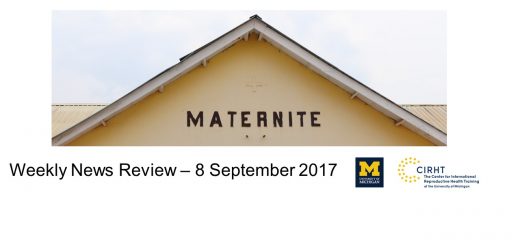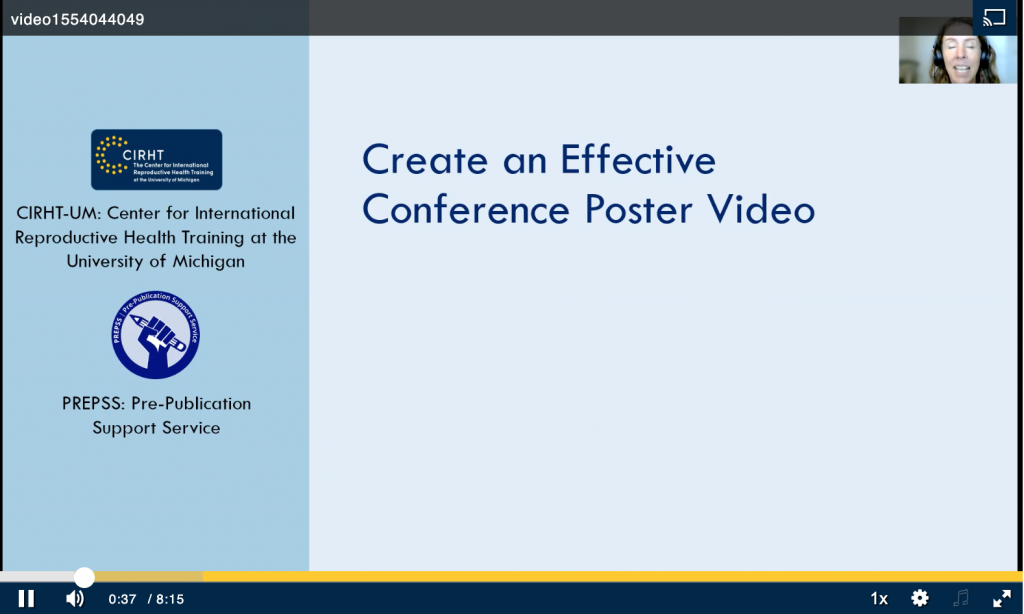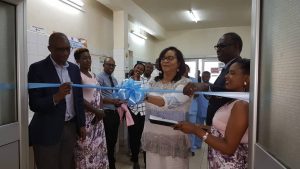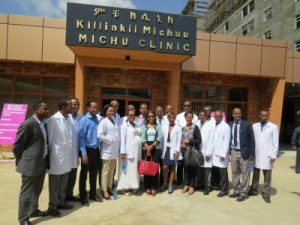News Review – 1 September 2017
Women
Achieving reproductive and family planning self-determination for women often requires overcoming “a variety of obstacles”, across societies everywhere in the world and with every income level, and concerning a range of issues, because, “reproduction is a matter of politics, economics, law, culture and everything else that shapes daily life.” Negotiating access to birth control is the most important skill the achieve gender equality, according to an interview in Forbes with NARAL President Ilyse Hogue. A call to fight for reproductive justice from Jess O’Connell, Chief Executive Officer of the Democratic National Committee: “When women have to choose between their family and their job, our entire economy suffers. So we can and we must do better as a nation. And the best way to fight back is to make sure that women also have a say in crafting the policies that affect their lives.”
In Nigeria, social norms can get in the way: “Due to religious and cultural sensitivities, Nigerians live in denial of just how common teenage sex is.” South Africa is facing a crisis because of the conscientious objection clause, which allows “health providers to recuse themselves from providing services on the basis of conscientious objection, [so] we have medical graduates who are unable to do a cervical examinations, insert an intrauterine contraceptive devise and refuse to do any abortion care. If a woman comes into emergency with a septic or incomplete abortion, there is limited capacity within the health care system to be able to provide care.” To combat the stigma, one South African organization, Fem, launched a social media campaign “to reveal the real face of safe abortion and how it can save women’s lives…approximately 50% of women who choose to undergo an abortion, choose facilities that are not up to standard and are potentially dangerous.” And actually having a baby can be “one of the most dangerous positions to be in. Pregnancy could pose a threat to a woman’s mind and body.”
Economic restrictions on access to family planning in the US can be related to actual costs and insurance coverage.
Once obtained, contraception’s side effects can “affect women’s daily lives”, including participation at work and in religious activities, according to The Evidence Project. A study from the University of Washington looks at Twitter comments about miscarriage, in the hope of helping “health care professionals learn what information is circulating, make sure patients know the true causes of miscarriage to lessen guilt and shame, and better support patients in a time of grief and stress.’ The University of Michigan’s Dr. Katherine J. Gold from the Department of Family Medicine looks at the need for personal and clinical support after a baby’s death: “Stillbirth and early infant death are devastating and often sudden events for families. Who delivers the news — and how they do it — can have lasting effects on a mother’s mental health.”
The conservative National Review worried about “coerced abortion”.
Happy stories about birth on the road: A woman in Kenya gave birth on a cross-country bus on her way back to college, assisted by female passengers; and in the UK, while in her car on the way to the hospital, a woman delivered her own baby in its full amniotic sac, 11 weeks early. (Her partner has the presence of mind to take a photo.)
Menstruation
Human Rights Watch released a guide to end discrimination and abuse of women because of their monthly cycles, saying menstrual hygiene is a human rights issue: “Pads and other supplies may be unavailable or unaffordable, they may lack access to safe toilet facilities with clean water where they can clean themselves in privacy, and they face discriminatory cultural norms or practices that make it difficult to maintain good menstrual hygiene. Together, these challenges may result in women and girls being denied basic human rights.” In Uganda, as one innovative program of “EcoSmart pads” is emerging, in the refugee camps in the north of the country, women are battling with menstrual hygeine. As the debate about “menstrual leave” continues in India, one writer takes a contrarian view, claiming people need “to rethink our understanding of menstruation in social and economic terms; basically, see it as work,” calling it “reproductive labour” and thereby justifying the time off.
Africa health systems
African health ministers meeting in Victoria Falls, Zimbabwe, this week committed “to attain universal health coverage”, calling it “the foundation for healthier communities, stronger economies and our collective security.” WHO Director-General Dr. Tedros Adhanom Ghebreyesus, called on them to take action to improve health care services in their own nations, with basic building blocks, as a WHO report blamed Africa’s health care inequality on lack of political will. A casualty of that inequality is what an essay in The Conversation calls the shameful practice of African politicians seeking medical care abroad. “Since the beginning of 2017, President Muhammadu Buhari of Nigeria has spent more time in the UK for medical treatment than he has in his own country. By seeking treatment abroad, Buhari broke one of his own electoral promises – to end medical tourism.”
Systems and Technology
In general, and for maternal health in particular, “many low- and middle-income countries rely on a robust community health workforce, but few are self-sustaining and many rely heavily on external donors. CHWs fill critical gaps while delivering quality, affordable services closer to underserved patients,” according to Global Health Now. A WHO report outlines the African health worker challenge: “As at 2015, the African Region had an average of 1.30 health workers per 1000 population, far below the 4.5 per 1000 required for SDGs. The global health workforce shortage…[is] most severe health [in the African region], estimated to reach 6.1 million by 2030.” The report offers solutions, chiefly reallocation of resources and increased training. In northern Nigeria, the UNFPA reports an “alarming shortage of health personnel” in conflict-affected areas, though in Borno more UN training is taking place.
A hopeful story from the Maternal Health Task Force shows how community health workers are helping to improve maternal health in Rwanda.
The Economist notes that, “In poor countries it is easier than ever to see a medic…but it is still hard to find one who will make you better.”
Britain’s rate of women dying in pregnancy is three times lower than the US, attributed in a report by ProPublica to that country’s strict adherence to procedural standardization.
Newly-minted USAID Administrator Mark Green reacted with anger to the Devex exclusive on gross inefficiency of the agency’s largest health project, resolving to reform how the agency procures and spends its money. Another, “under the radar” US agency, the Health Resources and Services Administration, which “has played a critical role in helping to bring infant mortality rates down” and disburses $300 million in family planning funding, is under budget scrutiny.
In Uganda, the ICT minister encouraged a healthcare hackathon focused on maternal and neonatal care: “Let us all embrace ICT for faster and efficient health interventions.” TEDGlobal in Tanzania this week spotlighted three African healthcare technological developments: Algorithms to detect diseases, ‘eye-phones’ and mobile hearing, and drone blood delivery. Two friends and supporters of Planned Parenthood reacted to the increasing restrictions on abortion access in the US (this week attacks in Arkansas and DC, fighting back in in Texas, South Carolina, and Maryland,) by creating an app called “Cara” which, “asks women for their zip code and how many weeks pregnant they are, and then it locates the closest clinic available for an abortion.”
The Maternal Health Task Force released two more useful resources: Giving Birth Without Clean Water and The Best Available Tools to Measure Women’s Childbirth Experiences.
Men
Men should be expected to be supporters, advocates and allies in all of those issues that women confront, as with a rural man from Ethiopia profiled by UNFPA who, “when community health workers visited… to talk about family planning, he was eager to listen. And when the contraceptive methods were explained, he knew immediately what he wanted to do” and had a vasectomy, “a choice that would help his wife regain her health by protecting her from unplanned pregnancies.” Lamido Sanusi, the Emir of the northern Nigerian state of Kano and the second highest Islamic authority in the country, is using his influence to reduce child marriage, promote the use of contraceptives and encourage child spacing. His daughters jokingly call him a “progressive fraud”, perhaps because of his four wives, but he is proposing what he says “is a ‘third-eye’… to offer reforms that can pass, because, if you say you are outlawing child marriage completely, they [the religious establishment] will respond that you can’t prohibit what has not been prohibited in Islamic law. But you can say it needs to be regulated.” (For a brief interview excerpt about family planning he made at the 2017 Mo Ibrahim Foundation Governance Weekend, click here). And men could soon more fully participate in family planning as doctors are saying they are “on the cusp of launching the first male contraceptive,” against resistance from the pharmaceutical industry.
But a worrying survey came out about how much men actually know about women: when asked to identify the vagina, only half of them were able to do so. “The survey results were released to coincide with the start of Gynaecological Cancer Awareness Month in the U.K., which falls in September, but the poll’s authors say their findings are a concern in that, for many men, women’s bodies are ‘still a taboo subject, shrouded in mystery.’”
Complete News Review References:
General/Global
Learning to See Menstruation as Reproductive Labour, The Wire, 1 Sep 2017
Reproductive Choice: Ask Cara, Community Word, 1 Sep 2017
Why Mothers Need Personal and Clinical Support After a Baby’s Death, M Health Lab, 31 Aug 2017
A Poll Asked Men To Identify The Vagina, Half Of Them Were Unable To Do So., Huffington Post, 31 Aug 2017
Hidden Abuse of Women: Coerced Abortions, National Review, 31 Aug 2017
How do contraceptive side effects affect women’s daily lives? A conversation with Aparna Jain, The Evidence Project, 31 Aug 2017
Sometimes the biggest obstacle to abortion is insurance, Vox, 31 Aug 2017
Why Giving Birth Is Safer in Britain Than in the U.S., ProPublica, 31 Aug 2017
This Stat Shows How Access To Birth Control Affects A Woman’s Paycheck & Makes An Argument …, Romper, 31 Aug 2017
Federal Judge Blocks Texas Anti-Abortion Law, NPR, 31 Aug 2017
‘Abortion Pill’ Mifegymiso to Be Covered by Saskatchewan Drug Plan, My Llloydminster Now, 31 Aug 2017
Conservatives Try to Separate Abortion and Women’s Health, Progressives Strike Back, Free Times, 31 Aug 2017
World Health Organization blames Africa’s health care inequality on lack of political will, Deutsche Welle, 30 Aug 2017
Tweetstorm September 5 to mark six-month anniversary of Trump Global Gag Order, Center for Health and Gender Equity, 30 Aug 2017
The politics of reproduction, Otago Daily Times, 30 Aug 2017
African Health Ministers commit to attain universal health coverage, WHO, 30 Aug 2017
The ex-KKK priest and the subtle terrorism of the anti-abortion movement, Religion Dispatches, 30 Aug 2017
Doctor Vows to Continue Providing Later Abortions After Anti-Choice Group Buys Out His Clinic Rewire, 29 Aug 2017
5 must-read debunks of the junk science abortion reversal scam, Media Matters, 29 Aug 2017
Keeping the faith in family planning, WACC, 29 Aug 2017
Woman delivers own baby in amniotic sac in her car – 11 weeks premature, The Independent, 29 Aug 2017
Religious young women less educated about HPV vaccine, Reuters, 29 Aug 2017
Soaring Teen Pregnancy Rates in the Philippines, News Deeply, 29 Aug 2017
‘Not At Home’ – women’s abortion testimonies as art, and To understand abortion travel, you have to be there, Irish Times podcast, 28 Aug 2017
Exclusive: USAID chief ‘angry’ about agency’s largest health project, Devex, 28 Aug 2017
Community Health Workers: A Priority for Universal Health Coverage?, Global Health Now, 28 Aug 2017
How to Talk to Your Doctor About Sex, Good Men Project, 27 Aug 2017
Menstrual Hygiene a Human Rights Issue, HRW, 27 Aug 2017
Planning and prevention: Nonprofit organization gives women access to contraceptives, Times Free Press, 27 Aug 2017
6 foods pregnant women should avoid, Global News, 26 Aug 2017
Heartbreak of pregnant mum faced with agonising choice – have an abortion or chemotherapy, The Mirror, 26 Aug 2017
This One Skill Will Help Us Achieve Gender Equality, Forbes, 26 Aug 2017
The Women’s March Was Just The Beginning, Refinery 29, 26 Aug 2017
Nationwide Offensive Devastates Independent Abortion Clinics, TruthDig, 26 Aug 2017
African politicians seeking medical help abroad is shameful, and harms health care, The Conversation, 25 Aug 2017
Improving Access to Cervical Cancer Screening and Treatment, Medscape, 25 Aug 2017
How Roe v. Wade affected abortion rates, The Lily, 25 Aug 2017
Maryland provider of late-term abortions under contract to be purchased by anti-abortion group, Washington Post, 25 Aug 2017
Under the Radar: This Agency is All About Access, MedPage Today, 25 Aug 2017
House Republican seeks to quash D.C. law banning reproductive discrimination, Washington Post, 25 Aug 2017
Arkansas appeals judge’s order blocking new abortion laws, KATV, 25 Aug 2017
Challenging the Narrative on Sex-Selective Abortion Bans, Ms. Magazine, 25 Aug 2017
Katharine Dexter McCormick: A Forgotten Trailblazer in the Birth Control Movement, How Stuff Works, 25 Aug 2017
In poor countries it is easier than ever to see a medic, The Economist, 24 Aug 2017
What The Public Is Saying About Miscarriage In 140 Characters, NPR, 24 Aug 2017
What needs to be done to solve the shortage of health workers in the African Region, WHO, 24 Aug 2017
Doctors on the cusp of launching the first male contraceptive, CNBC, 24 Aug 2017
Self-determined life for women, D+C, 4 Aug 2017
Academic
The Safest Methods for Inducing Abortion, Medscape, 30 Aug 2017
Feminist Judgments: Reproductive Justice Rewritten, Temple University, 30 Aug 2017
Giving Birth Without Clean Water, MHTF, 28 Aug 2017
The Maternal Health Thematic Fund – Towards Equality in Access, Quality of Care and Accountability, Phase II (2014-2017) – Progress report, ReliefWeb/UNFPA, 28 Aug 2017
The Best Available Tools to Measure Women’s Childbirth Experiences, MHTF, 25 Aug 2017
Egypt
Egypt promotes birth control to fight rapid population growth, Reuters, 30 Aug 2017
Eritrea
Maternity center under construction, Shabait, 31 Aug 2017
Ethiopia
Men in rural Ethiopia show that family planning is not just a women’s issue, UNFPA, 28 Aug 2017
Breast Cancer Replaces Cervical Cancer as Top Women Illness in Ethiopia, Semonegna, 28 Aug 2017
Kenya
Woman did not expect to give birth inside bus, Daily Nation, 28 Aug 2017
Kenya women having fewest children in East Africa, The East African, 27 Aug 2017
Namibia
High teenage pregnancy rate concerns Geingos, New Era, 29 Aug 2017
Nigeria
NURHI targets 12.5 % increase in FP usage through improved services, Nigerian Tribune, 31 Aug 2017
Alarming shortage of health personnel in conflict-affected Nigeria, UNFPA, 29 Aug 2017
UN trains professionals on health services in Borno, PM News, 28 Aug 2017
Lamido Sanusi, Kano’s ‘progressive fraud’, takes aim at child marriage in Nigeria, The Guardian, 25 Aug 2017
The fates of two teenage mothers, D+C, 9 Aug 2017
ARFH enhances visibility of female condom in Nigeria: distributes counselling guidelines and posters throughout Nigeria, ARFH, 9 Aug 2017
Face the truth, D+C, 8 Aug 2017
Rwanda
From Local Action to National Results: How Community Health Workers Are Helping to Improve Maternal Health in Rwanda, MHTF, 30 Aug 2017
Lifting up Youth: Q&A with Jean Christophe Rusatira, Global Health Now, 30 Aug 2017
Sierra Leone
PPASL donates, gives free reproductive health treatment, Concord Times, 30 Aug 2017
South Africa
The hard labour of pregnancy, Mail & Guardian, 1 Sep 2017
Fem fights abortion myths in South Africa, Perdeby, 29 Aug 2017
Allow women to ‘vote’ with their conscience, Daily Maverick, 28 Aug 2017
New initiative to tackle Fetal Alcohol Spectrum Disorder, IOL Cape Argus, 27 Aug 2017
Tanzania
Phones and drones transforming healthcare in Africa, ENCA, 31 Aug 2017
Maternity centre in Musoma on the horizon, The Citizen, 30 Aug 2017
Woman wants 200m/- relief for ‘botched’ delivery, Daily News, 28 Aug 2017
Uganda
Women and children grappling with menstrual hygeine in refugee camps, The Observer, 1 Sep 2017
Affordable and #innovative solution to keep girls in school by EcoSmart Pads, UpAccelerate, 31 Aug 2017
Aspirin can help prevent preeclampsia in pregnant women, The East African, 31 Aug 2017
Innovate purposefully to solve society challenges, New Vision, 30 Aug 2017
New maternal centre at Mulago hospital is a beauty, pride; please let it remain so, Daily Monitor, 30 Aug 2017
Zambia
‘No under 21s’, Times of Zambia, 29 Aug 2017






